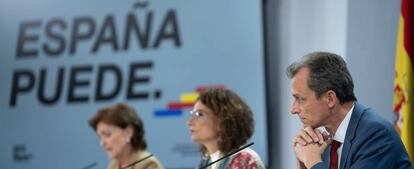Spain drafts bill against remaining legacy of Franco era
The new law will offer citizenship to the descendants of members of the International Brigades

The Spanish Cabinet on Tuesday approved a draft bill containing a raft of measures that address the legacy of the Civil War (1936-39) and the Francisco Franco regime, which lasted until the dictator’s death in 1975.
The Democratic Memory bill, which builds on existing historical memory legislation, contemplates closing down associations that still glorify the late dictator’s memory, including the Francisco Franco Foundation, which will be declared illegal.
The text also proposes extending eligibility for Spanish citizenship to the descendants of members of the International Brigades, who fought on the republican side in the war.
“The descendants of the members of the International Brigades who fought for freedom and against fascism in Spain will be eligible for Spanish nationality. It was time for this government to say to these heroes and heroines of democracy: thank you for coming," tweeted Podemos leader Pablo Iglesias, who serves as the Deputy PM in charge of social affairs and the 2030 Agenda.
Los descendientes de los brigadistas internacionales que combatieron por la libertad y contra el fascismo en España, podrán acceder a la nacionalidad española. Ya era hora de decir desde el Gobierno a estos héroes y heroínas de la democracia: gracias por venir ✊ pic.twitter.com/t8Xy5TgqvQ
— Pablo Iglesias 🔻 (@PabloIglesias) September 15, 2020
With this bill, the government also wants to turn the Valley of the Fallen, a controversial, state-run civil war memorial outside Madrid, into a place of collective memory. Last year Franco’s remains were exhumed from the site and transferred to a Madrid cemetery following a long legal battle with the dictator’s descendants.
The bill also makes provisions for the creation of a specialized prosecutor’s office for democratic memory and human rights, and for a national DNA bank to help with the exhumation of victims from mass graves, to be funded with public money. Forensic expert Francisco Etxeberria, who has advised the government during the drafting of the bill, estimates that between 20,000 and 25,000 bodies could be recovered from mass graves in the next four to five years.
“This is an important law for the government, but also for Spanish democracy,” said Deputy Prime Minister Carmen Calvo, of the Socialist Party (PSOE), on Tuesday.
Prime Minister Pedro Sánchez, who leads a minority government in coalition with the leftist Unidas Podemos, had pledged to improve on the 2007 Historical Memory law passed under the government of José Luis Rodríguez Zapatero, also of the PSOE. But Sánchez will need to secure additional support to get the bill through parliament.
On Tuesday, Senator Javier Maroto of the main opposition Popular Party (PP) said that the executive is using this bill to cover up “its management and its lies” in connection with the Covid-19 crisis. But Maroto did not specify whether the center-right party would vote for or against the bill in the Congress of Deputies.
Voiding Francoist trials
Calvo said the law would declare void all the summary trials held in Francoist Spain, honoring a longstanding demand by historical memory associations.
Calvo also said that overturning those legal proceedings is the best form of reparation for the political trials that led to the summary execution of “important people such as [Lluis] Companys,” alluding to the president of Catalonia between 1933 and 1940 who was shot by a firing squad at Franco’s orders. Catalan premier Quim Torra had recently asked the government of Spain to apologize for that execution.
This is an important law for the government, but also for Spanish democracyDeputy PM Carmen Calvo
Additionally, the bill significantly alters the way Francoism is to be taught in primary and secondary schools across Spain. United Nations Special Rapporteur Pablo de Greiff had said in a report about Spain that some schoolbooks described the civil war “in generic terms, perpetuating the notion of symmetric responsibility [by both sides].”
“Spanish democracy could not afford one more day without a law like this one,” said Calvo. “Our young people need to know where we come from. They need knowledge about what must never happen again.”
Steep sanctions
Unlike the 2007 law, which did not set out any sanctions for violators, any infringement of the future law will come with penalties that could be as high as €150,000 in the most egregious cases, warned Calvo.
In a recent interview with EL PAÍS, Calvo said that the 66 items in the bill lay out the foundation “to build a common democratic memory for all Spaniards.”
English version by Susana Urra.
Tu suscripción se está usando en otro dispositivo
¿Quieres añadir otro usuario a tu suscripción?
Si continúas leyendo en este dispositivo, no se podrá leer en el otro.
FlechaTu suscripción se está usando en otro dispositivo y solo puedes acceder a EL PAÍS desde un dispositivo a la vez.
Si quieres compartir tu cuenta, cambia tu suscripción a la modalidad Premium, así podrás añadir otro usuario. Cada uno accederá con su propia cuenta de email, lo que os permitirá personalizar vuestra experiencia en EL PAÍS.
¿Tienes una suscripción de empresa? Accede aquí para contratar más cuentas.
En el caso de no saber quién está usando tu cuenta, te recomendamos cambiar tu contraseña aquí.
Si decides continuar compartiendo tu cuenta, este mensaje se mostrará en tu dispositivo y en el de la otra persona que está usando tu cuenta de forma indefinida, afectando a tu experiencia de lectura. Puedes consultar aquí los términos y condiciones de la suscripción digital.








































